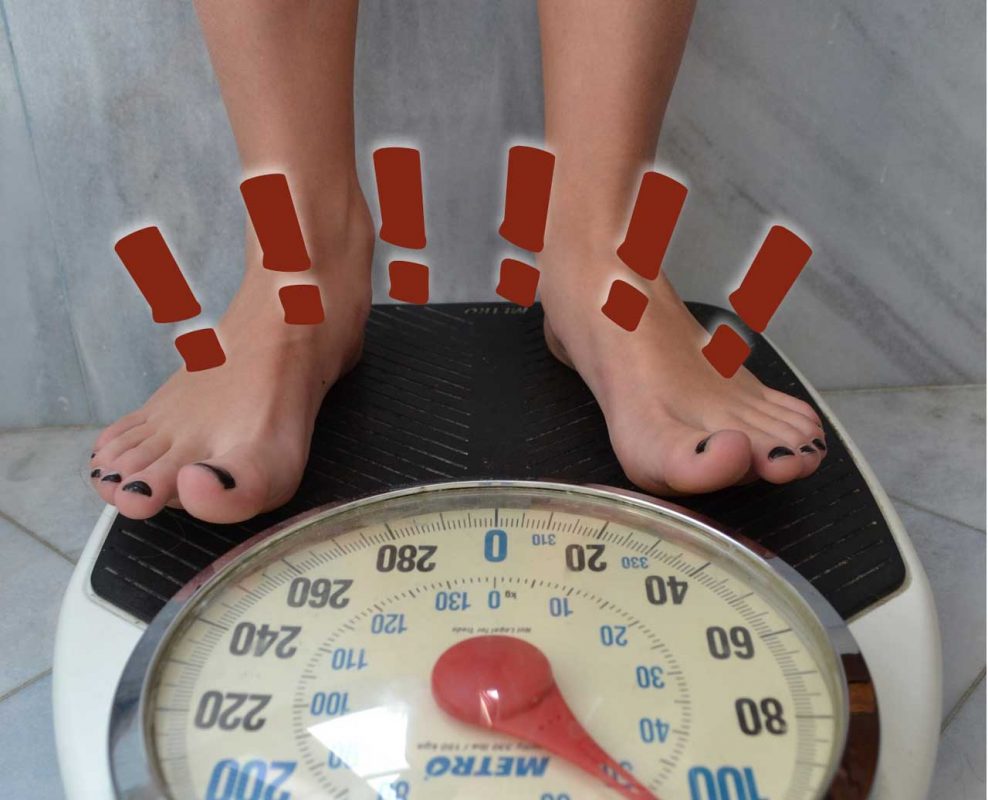A person can be both overweight and anorexic. A focus on weight alone is misleading as a signal to seek treatment, because a person’s near- or above-normal weight may mask life-threatening behavior based on anxiety around food. A person with disordered eating behavior may feel invalidated by comments like:
- “You don’t look sick.”
- “Your BMI is in the normal range, so there’s nothing to worry about.”
- “Wow, you look great! Have you lost weight?”
These words are meant to support. But they can be isolating and even devastating for men, women, girls, and boys who are struggling with anorexia.
A Person May be Underweight, Average, or Overweight and Anorexic
A misconception about anorexia is that it only has to do with a person’s weight.
By the time a person comes for therapy, they may have become underweight. But often, a person with anorexia may appear “normal weight.” The person may look fine or even above normal. But for their specific body’s needs, they are starving themselves and are plagued with symptoms including hyper-control around food, low self-worth, and trouble managing emotions.
Just like shoe size and eye color, your ideal weight is based on your genetics. Supporting your genetics with appropriate nutrition, exercise, meaningful relationships, and enjoyable hobbies will keep your body in its ideal weight range. Trying to figure out your ideal weight based on popular measures such as BMI charts gives misleading and inaccurate results. For instance, BMI does not take into consideration a person’s behaviors, body shape, composition (muscle vs. fat), or their ethnicity.
The Importance of Support From Friends and Family
Many times, friends and family misread the gravity of the situation. They may tend to dismiss the idea a loved one may be struggling with anorexia. They may think, “a person can’t be overweight and anorexic,” but that is not true — people can.
It may look like a person is doing a good thing by “eating healthy.” Telling a person struggling with eating behavior that they seem to be eating well can trigger even more self-doubt just when the person could benefit from openness, outreach, and acceptance.
Family members may decide to agree with a doctor’s assessment because it calms their concerns. But medical professionals can miss the need to look closer and ask important questions, especially when a child or adolescent is losing weight. Doctors may not recognize a person with anorexia because of a tendency to give bodyweight too much credit in determining health or illness.
Failing to ask questions when anyone regardless of age is losing weight is a huge problem. Family members and physicians should always inquire about weight loss – What is the context? Could there be a hidden struggle with the emotional stress that a person is desperately trying to manage? Are there issues at home or at school that may indicate a need for support? How restrictive has a person’s eating habit become? Has weight loss become a main focus of attention? Can a person eat in restaurants or family gatherings without anxiety or stress? These are only a few questions that should be addressed.
Challenging Cultural Norms Around Wellness
Recovery work also means challenging widely held values around thinness. There’s an incorrect assumption that thin equals healthy.
New health studies and the Health at Every Size community are helping us recognize mistaken ideas. Research shows that people identified as overweight or moderately obese live just as long — or longer — than leaner people. A person’s long-term health outlook depends on much more than weight. Researchers have found that nutrition, exercise, activity level, fitness level, and socioeconomic status matter just as much to a longer lifespan — regardless of body weight.
As a therapist, I welcome the idea that health is about fitness not fatness. It comes from extensive research that challenges common values around being thin. A leading researcher is Dr. Linda Bacon, the author of the bestselling book, Health at Every Size: The Surprising Truth About Your Weight. She freely provides many helpful resources to learn about weight, fitness, and health (see Resources below).
The Difference Healing Makes
Even if the idea of changing size or how you eat is scary, I believe that you will discover much that is beautiful and strong in yourself as you explore new ideas. If there is one idea I would like to encourage now, it’s that you don’t have to struggle forever with a sense that being okay with yourself must be about your body size.
There are so many possible, healthy and valid ways to feel deeply okay about yourself. You can discover and enjoy fitness by many other measures than size. Healing allows you the freedom to experience:
- Warmer, more secure relationships
- The strength to hold uncomfortable feelings with kindness
- Greater self-compassion
- Grounding yourself in nature
- Calming yourself with breathing
- Feeling safer exploring thoughts, feelings and emotions
- Understanding yourself better
- Letting yourself feel what you feel (radical acceptance)
- Being able to comfort the hurt in yourself or others.
Healing means working with your mind, emotions, and body together, to live a healthier life you enjoy.
We Are Here For You
We have special training and experience in the treatment of eating disorders in Alexandria, VA. To learn more please contact us:
Resources
FEAST – An organization with many resources for caregivers, family and friends – anyone impacted by an eating disorder
NEDA hotline (800) 931-2237 – A crisis support line from the National Eating Disorders Association
Resources for Health at Every Size from Dr. Linda Bacon
Health at Every Size community


